商务现场口译UNIT1 总主编:徐小贞
任务驱动法下的高职英语口译教学

、
较差,特别是英语 口语 、听力能力。这 主要是 由于相当数量 的学生在 3 . 设定任务剧本 进人高职教育之前 ,没有进行过英语的听说教育和培训。因此,高职 任务剧本主要是指教师针对不同教学 目标和教学环境设定 的教学 口译教学普遍面l 学生 “ 听不懂 、说不出”的困难 ,进而导致学生在 剧本 ,这个 剧本包括本次教学课程中,学生所扮演的 口译角色 、需要 学习中缺乏主动性和积极性 。此外 ,相关课程设置较少也导致在较短 掌握的口译技能以及具体实施过程 中的剧情细节。 的高职教育时间中, 难 以培养 出满足市场需求 的口译人员 。 4 . 安排学生活动 ( 二 )相 关教 学方 法 落后 安排学生活动是指教师在课堂上按照预先规划好 的剧情 ,安排学 首先 ,高职口译教育缺乏培养 目标的针对性 。高等职业教育的培 生进行演练和教学 。 在这个过程 中, 教师要注重对学生的鼓励和引导 ,
本 文提 出了将任 务驱动 法运用到高职 英语 口译教学 中,按照任务驱动 法的五个步骤进行课堂教 学,提 高口译教学效果。 【 关键词 】 高职英语 ;口 译教 学; 任务驱动法 随着我 国的不 断进步 ,对外政治 、经济和文化交流活动已成为 目
( 二 )高 职 口译 教 育 中 的任 务 驱 动 法 针对我国高职教育中存在的问题和高职教育的客观环境 ,本文提 出了一种应用于高职口译教育的任务驱动法模型 ( 如图 l 所示 )。
前社会发展的重要组成部分。 口 译是一种在现场以 口头方式将一种语 言所表达的思想和情感用另一种语言准确 、完整进行重新转述的语言 技能 ,是 国际合作交流中连通中外交流最为重要的桥梁
商务现场口译1复习题.doc

《商务现场口译1》复习题一、汉译英我们公司打算以削价的方式处理库存商品。
如果贵公司订购超过30000美元,我们将提供九折优惠。
Our company is planning to dispose of the stocks at a discount.If your company places an order for more than US$30,000, we will allow you a 10% discount.我们公司一直谋求在河南发展业务,希望开拓新的市场。
如果你们能预付现金,我们可以把价格降到100美元。
Our company has been expanding our business into Heenan in order to develop a new market.If you make cash payment in advance, we can drop the price to 100 US dollars・我们可以为你们公司建设网站,介绍你们的主耍产品。
货款需在40天内付清,预付现金可获3%折扣。
We can build a website for your company, with descriptions of your major products.We require full payment within 40 days, with a 3% discount for cash payment in advance・我们公司拥有最好的系列产品,并致力于提供优质服务。
由于我们商定的交货FI期已过,请告诉我们确切的装运H期。
Our company has the best product line and is dedicated to quality service・Since the agreed delivery date has passed, please tell us the exact shipping date.很抱歉,我们刚刚发了一大批货,目前没有存货了。
商务现场口译unit
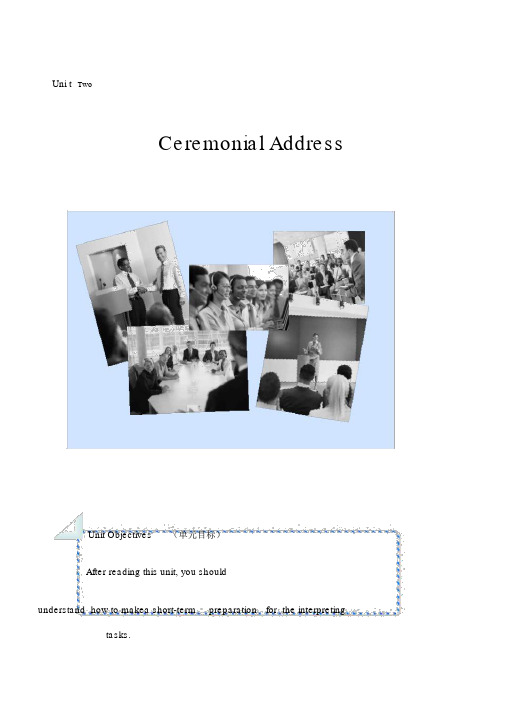
Uni t TwoCeremonial AddressUnit Objectives(单元目标)After reading this unit, you shouldunderstand how to makea short-term preparation for the interpreting tasks.find ways to improve your interpreting skills and performance.master the basic words and expressions about ceremonial address.know some cultural background knowledge about ceremonial address.I. Interpreting Skills( 口译技能 )Read the following presentation about short-term preparation.Try tounderstand what and how to prepare for the interpreting tasks in theshort run. Then complete the following task:Suppose you are going to work as an interpreter for a businessman whois going to make a ceremonial address. How are you going to preparefor it and what questions are you going to ask if you are able to contactthe organizer or the speaker before the interpretation starts? Workin groups and work out a question list.Preparing Training (II): Short-term Preparation(短期准备)Short-term preparation in interpreting refers to the job that can only beprepared shortly before the interpreting task is taken. In contrast with long-termpreparation,short-term preparation is more direct and concrete,as each interpreting task is different from one another. The interpreter works for different speakers and on different subjects. In real interpreting situations,pre-interpreting preparation is usually referred to as short-term preparation.What to Prepare?After an interpreter has accepted an interpreting assignment, they shall start to prepare for the task immediately. Following are the essential items that theinterpreter shall prepare.1. Meeting DocumentsThe meeting documents are a great help to the interpreters. It is advisable for interpreters to ask the organizer to provide the complete documentation(文件) and background information for the task as early as possible, such as the meeting schedule (时间表) , list of participants(参加者), introduction of the keynotespeakers (主题发言人) etc. He must try to understand“who is the speaker? whatis the subject?what is the occasion? who is the audience? and what type of speech is it?” .2. A Glossary ListAfter getting the documents, the interpreter is then able to know the topics and subjects he is going to deal with. At this time, an experienced interpreterwill work out a list of glossary and terminology (术语)he will potentially encounterin interpreting. A prepared glossary list sometimes helps the interpreter out when he comes across new words.3. Dictionaries, Notebooks and PensInterpreting is often done in an uncertain situation. There are always somewords and expressions beyond the interpreter ’s mind and preparation.In this case, some classified dictionaries(分类词典) may be of great help. An experienced interpreter always brings certain dictionaries, which they can consult wheneverpossible. In addition, note-books and pens are also necessary in interpreting. As interpreters usually take notes in interpreting, two top-opening notebooks(竖翻式笔记本)and knock-gell pens(按压式水笔)are therefore recommended for interpreters to carry.Such note books and pens are easily handled in interpreting situations.4. Dresses and Name CardsIn addition, interpreters should know the general dress code(着装要求) before the meeting starts. Interpreters are always expected to dress appropriately andbehave respectfully when they attend the meeting. Moreover, business cards(名片) are also necessary as interpreters sometimes receive name cards from theorganizer and the speakers. Therefore, interpreters should prepare their own cards to offer them in return. Otherwise, it would make them embarrassed.How to Prepare?The following three ways are suggested that interpreter do when making short-term pre-interpreting preparation.1. Read through the Relevant DocumentsBefore an interpreter begins to work, he should read through the documents heis able to obtain and organize all the documents in an easily recognizable way sothat he can find them immediately when the speaker is delivering his speech. Ifhe has translated some of the texts beforehand, he should also classify the translated texts and put them in order.2. Surf the InternetThere is plenty of information in Internet. By surfing the net, the interpreter may find some important information that is related to the interpreting tasks,such as the background of the key-note speakers; the introduction to the related organizations etc.. It is suggested that interpreters find an Internet access and make full use of it.3. Contact the Organizer and the SpeakerBriefings(碰头会)are potentially a very useful part of advance preparation. They are meetings organized for the interpreter, with the participation of theorganizer and the speakers. At the briefing, the interpreter can ask specificquestions and get some general information. Sometimes, some speakers have strong accents. If possible, interpreters should attempt chance to talk personally withsuch participants before the real task begins so as to be familiar with their accents and improve the accuracy of the interpretation.4. Prepare a question listBefore taking the interview with the organizer and the speaker, interpretersare supposed to prepare a question list(提问单)in advance, as both the organizer and the speaker are usually rather busy. The questions must be to the point. Aprepared question list will be of great help during the interviews. Following isa sample question list:A Sample Question ListTo Organizer:1.May I have the schedule? Will there be any changes about the schedule?2. Is it possible for me to have the speakers’ speech drafts or ppt slides?3.Who will attend the conference? Is there a Q & A session?4.Who are the key-note speakers? How can I get in touch with them?To Speaker:1.How long will the speech last?2.What are your main points? Are you going to add or cut any points?3.Are you going to use any technical terms?4.May I have your draft or ppt slides?II. Phrase Interpreting( 短语口译 )Work on the following words and phrases. Interpret them into Chineseand English respectively.A.English to Chinese1.Take this opportunity2. Cherish3.Signing ceremony4. Witness5.Extend sincere thanks to⋯.6. Appreciatest but not least8. Enhance9.At his earliest convenience10. WorkshopB. Chinese to English1、司仪2、嘉宾3、值此⋯⋯之际4、友好使者5、良好祝愿6、衷心感谢7、热情好客8、应⋯⋯的邀请9、代表10、无以伦比的III.Sentence Interpreting(句子口译)Work on the following sentences. Interpret them into Chinese andEnglish respectively.A.English to Chinese1.I feel honored to come here on my first visit to your beautiful city.2.I would like to take this opportunity to extend our sincere thanks to ourhost for their earnest invitation and the gracious hospitality.3.Although there is a distance of tens of thousands of miles between us, "Longdistances separate no bosom friends", as one of your Tang poets once said.4.I greatly cherish thevalue the position wepartners. close relationship between our two cities.I also greatly enjoy as one of your most important trading5.On behalf of the foreign guests attending this workshop, let me offer a mostsincere “thank you ” for you warm and gracious welcome.B.Chinese to English1、我代表中国政府和人民,并以我个人的名义,向贵国人民致以亲切的问候和良好的祝愿。
英语专业优秀毕业论文
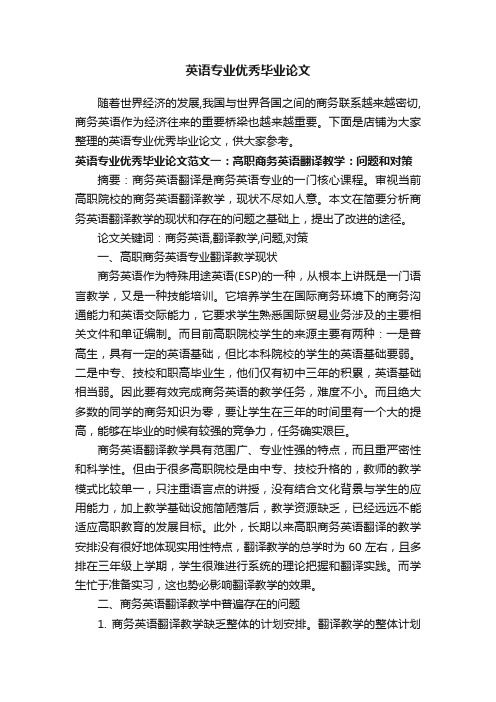
英语专业优秀毕业论文随着世界经济的发展,我国与世界各国之间的商务联系越来越密切,商务英语作为经济往来的重要桥梁也越来越重要。
下面是店铺为大家整理的英语专业优秀毕业论文,供大家参考。
英语专业优秀毕业论文范文一:高职商务英语翻译教学:问题和对策摘要:商务英语翻译是商务英语专业的一门核心课程。
审视当前高职院校的商务英语翻译教学,现状不尽如人意。
本文在简要分析商务英语翻译教学的现状和存在的问题之基础上,提出了改进的途径。
论文关键词:商务英语,翻译教学,问题,对策一、高职商务英语专业翻译教学现状商务英语作为特殊用途英语(ESP)的一种,从根本上讲既是一门语言教学,又是一种技能培训。
它培养学生在国际商务环境下的商务沟通能力和英语交际能力,它要求学生熟悉国际贸易业务涉及的主要相关文件和单证编制。
而目前高职院校学生的来源主要有两种:一是普高生,具有一定的英语基础,但比本科院校的学生的英语基础要弱。
二是中专、技校和职高毕业生,他们仅有初中三年的积累,英语基础相当弱。
因此要有效完成商务英语的教学任务,难度不小。
而且绝大多数的同学的商务知识为零,要让学生在三年的时间里有一个大的提高,能够在毕业的时候有较强的竞争力,任务确实艰巨。
商务英语翻译教学具有范围广、专业性强的特点,而且重严密性和科学性。
但由于很多高职院校是由中专、技校升格的,教师的教学模式比较单一,只注重语言点的讲授,没有结合文化背景与学生的应用能力,加上教学基础设施简陋落后,教学资源缺乏,已经远远不能适应高职教育的发展目标。
此外,长期以来高职商务英语翻译的教学安排没有很好地体现实用性特点,翻译教学的总学时为60左右,且多排在三年级上学期,学生很难进行系统的理论把握和翻译实践。
而学生忙于准备实习,这也势必影响翻译教学的效果。
二、商务英语翻译教学中普遍存在的问题1. 商务英语翻译教学缺乏整体的计划安排。
翻译教学的整体计划非常重要,因为它决定着该课程的教学目的、方法、教材的选择和课程的设置等诸多方面。
商务口译 Lesson 1
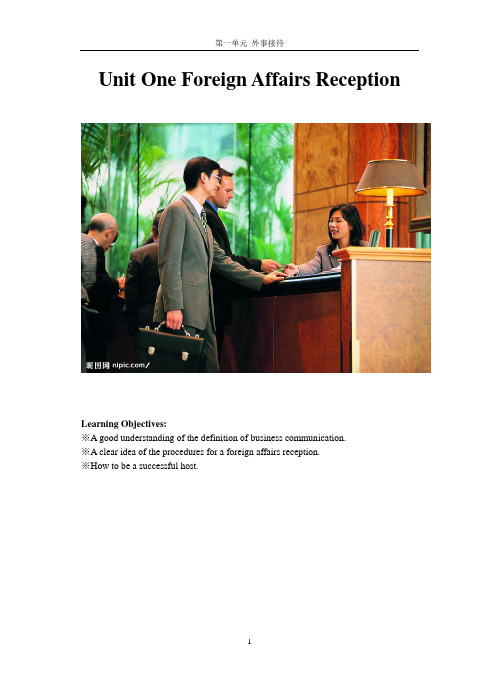
Unit One Foreign Affairs ReceptionLearning Objectives:※A good understanding of the definition of business communication.※A clear idea of the procedures for a foreign affairs reception.※How to be a successful host.Background InformationWith China’s entry into the WTO and the Olympic Games held in Beijing, the relationship between China and Western countries in politics, economy, and culture is getting increasingly closer. There is no doubt that etiquette will play an important role in this process. Every nation has its own etiquette standard which is created with the spirit of the nation. Generally, when communicating with members of our own culture, we internalize the etiquette that governs our contextual behavior, and we are able to communicate without giving much thought to those rules. But when we are engaged in intercultural communication, we must be aware of how our culture influences the communication context; otherwise, we may encounter a variety of surprises.Americans tend to be informal and friendly. Both men and women shake hands on occasions of meeting and leaving. A small kiss on the cheek or a hug is appropriate between men and women who have known each other for a long time. First names generally are used with the exception of senior persons or formal settings. However, these greeting behaviors typical to North Americans are uncommon in many cultures. China offers a contrasting example. Chinese greetings are formal, using titles and last names. First names are used only among close friends. Again, business cards are translated into standard Chinese and are routinely exchanged. Therefore, a general knowledge of meeting and seeing-off etiquette is helpful because there are many occasions on which we are likely to encounter people from cultures different from our own.Vocabulary Development国际机场international airport候机大厅waiting hall抵达时间arrival time随身携带行李carry-on baggage接待to host / to receive受到友好接待to be cordially received 设宴洗尘to give a banquet in somebody’s honor招待客人to entertain guests外宾foreign guests贵宾distinguished guests外事办公室foreign affairs office外事往来dealings with foreign organizations活动日程itinerary of a visit 初步拟订的活动日程tentative itinerary 精心的安排thoughtful arrangements期待已久long-expected合作共事to work as your colleague专程赶来to come all the way亲自接待to meet in person欢迎辞welcome speech/address告别辞farewell speech/address深感荣幸to feel greatly honored合作愉快fruitful cooperation提供住宿accommodate有收获的rewarding回顾in retrospect期待再次来访look forward to you visiting again保持联系keep in touch 送别to see somebody off 致意send regards to 飞行愉快pleasant flight 代表on behalf ofDialogueDirection: Interpret the following dialogue alternatively into English and Chinese Miss Liu is a foreign affairs officer in a cosmetics factory .Today she is assigned to meet Johnson, an agent from America.L:你一定是来自美国的Johnson吧。
商务英语口译教程单元一
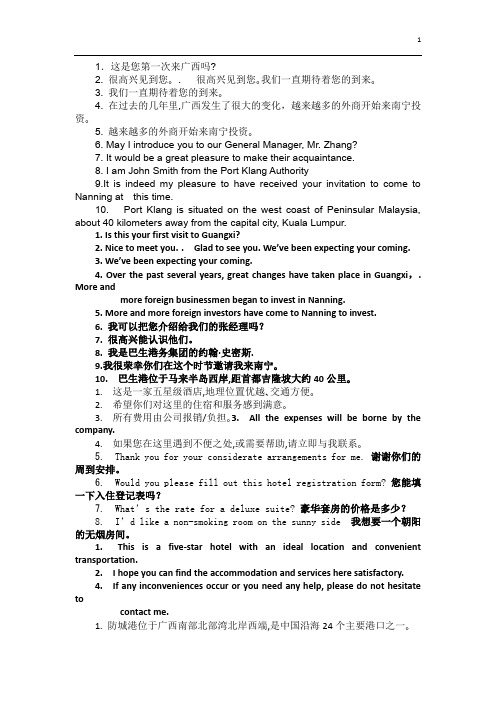
1.这是您第一次来广西吗?2. 很高兴见到您。. 很高兴见到您。我们一直期待着您的到来。3. 我们一直期待着您的到来。4. 在过去的几年里,广西发生了很大的变化,越来越多的外商开始来南宁投资。5. 越来越多的外商开始来南宁投资。6. May I introduce you to our General Manager, Mr. Zhang?7. It would be a great pleasure to make their acquaintance.8. I am John Smith from the Port Klang Authority9.It is indeed my pleasure to have received your invitation to come to Nanning at this time.10. Port Klang is situated on the west coast of Peninsular Malaysia, about 40 kilometers away from the capital city, Kuala Lumpur.1. Is this your first visit to Guangxi?2. Nice to meet you.. Glad to see you. We’ve been expecting your coming.3. We’ve been expecting y our coming.4. Over the past several years, great changes have taken place in Guangxi,. More andmore foreign businessmen began to invest in Nanning.5. More and more foreign investors have come to Nanning to invest.6. 我可以把您介绍给我们的张经理吗?7. 很高兴能认识他们。
实用经贸英语口译Unit 1 商务礼仪与接待[精]
![实用经贸英语口译Unit 1 商务礼仪与接待[精]](https://img.taocdn.com/s3/m/5a0a1cb2d4d8d15abe234e3e.png)
The tortuous road which has led from Montgomery, Alabama to Oslo bears witness to this truth. This is a road over which millions of Negroes are travelling to find a new sense of dignity. This same road has opened for all Americans a new era of progress and hope. It has led to a new Civil Rights Bill, and it will, I am convinced, be widened and lengthened into a super highway of justice as Negro and white men in increasing numbers create alliances to overcome their common problems.
I refuse to accept the cynical notion that nation after nation must spiral down a militaristic stairway into the hell of thermonuclear destruction. I believe that unarmed truth and unconditional love will have the final word in reality. This is why right temporarily defeated is stronger than evil triumphant. I believe that even amid today's mortar bursts and whining bullets, there is still hope for a brighter tomorrow. I believe that wounded justice, lying prostrate on the blood-flowing streets of our nations, can be lifted from this dust of shame to reign supreme among the children of men. I have the audacity to believe that peoples everywhere can have three meals a day for their bodies, education and culture for their minds, and dignity, equality and freedom for their spirits. I believe that what self-centered men have torn down men other-centered can build up. I still believe that one day mankind will bow before the altars of God and be crowned triumphant over war and bloodshed, and nonviolent redemptive good will proclaim the rule of the land. "And the lion and the lamb shall lie down together and every man shall sit under his own vine and fig tree and none shall be afraid." I still believe that we shall overcome!
英语专业(英日双语方向)综合技能实训中学生实践能力培养[论文]
![英语专业(英日双语方向)综合技能实训中学生实践能力培养[论文]](https://img.taocdn.com/s3/m/6686e603763231126edb1156.png)
探索英语专业(英日双语方向)综合技能实训中学生实践能力的培养摘要:为了体现应用型、复合型人才培养的特色,在实际教学过程中,教师要注重学生专业能力的培养和专业技能训练,更要注重学生解决问题的能力、创新能力和适应能力的培养。
关键词:英语专业;综合技能实训;实践能力;培养一、实践能力的构成学生的实践能力包括两方面的内容:一是应用就学期间所学的理论知识、观点来完成学业,同时动手、动脑进行综合技能训练等的自主学习能力以及运用所学知识来获取新知识的能力和人际交往等方面的能力;二是参与社会活动中,或在已有的基础上新增长的独立发现问题、分析和解决问题的能力。
二、培养学生实践能力的意义实践能力的增强是大学生全面发展的重要体现,是提升创新能力和创造能力的基础,这对大学生择业、就业和创业具有极其重要的意义。
三、综合技能训练中培养学生的实践能力综合技能实训课程根据市场对人才的需求和学生的特点来制定培养目标和教学计划,注重创新能力的培养。
因此,为培养学生的实践能力,把以往的以教师为核心的教学模式转变为以学生为主体、教师为主导的教学模式;把单纯传授知识技能为主的教学模式转变为培养学生会学习、会创新为主的教学模式。
教学过程以学生自主活动为基础,为学生思考、探索和创新提供空间,引导学生发挥学习的自主性,形成良好的心态,增强自信心。
教师要鼓励学生多提问,善于从多角度看待问题、思考问题,激励学生的创新热情。
(一)培养专业能力根据专业能力培养的需要,编写实践教学计划,明确每个实践环节的内容、要求和目标,采用工作情景模拟、任务和角色扮演等方法开展实训。
1.工作情景模拟。
这是以工作过程为导向的工作情景模拟,它旨在让学生学会运用商务日语进行接待、口译、函电和应用文写作。
例如,商务应用文实训时,可设计求职应聘模拟场景,具体操作步骤为准备、划分小组、分派角色(分别扮演参加应聘者和招聘公司的人员);分派任务时要求应聘者拟写简历和求职信,要求招聘公司设计招聘时所要询问的问题;面试演练要求各组都用日语演练求职面试过程,面试环节包括问候语、开场白、面试问答和结束语。
商务现场口译答案1—18单元 (真正 全 )赵小贞主编

商务现场口译答案1—18单元( 全)Unit1Phrase InterpretingA1. to recover from the jet lag2. thoughtful arrangement3. hospitality4. souvenir5. accommodations6. to claim baggage7. to proceed through the Customs 8. itinerary9. farewell speech 10. to adjust to the time difference1.倒时差2.周到的安排3.热情好客4.纪念品5.食宿6.提取行李7.进行海关检查8.活动安排9.告别词10.适应时差B1.为……设宴洗尘2.向……告别3.不远万里来到… 4.很荣幸……5.久仰大名6.欢迎词7.赞美8.回顾过去9.展望未来10.美好回忆1. to hold a banquet in honor of...2. to bid farewell to...3. to come all the way to...4. to be/feel honored...5. I have long been looking forward to meeting you.6. a welcoming address7. to pay tribute to 8. to look back9. to look ahead 10. happy memoryDistinguished Guests, Ladies and Gentlemen,Thank you very much for your gracious welcoming speech. China is one of the earliest cradles of civilization and the visit to this ancient nation has long been my dream. This visitwill give me an excellent opportunity to meet old friends and establish new contacts. I wishto say again that I am so delighted and privileged to visit your great country and this lovely town. I am deeply grateful for everything you have done for me since my arrival in China.As an American manager of a Sino-American joint venture for two years, I have to say that there are differences in business management practice between Chinese and Americans. We are more direct and straightforward than most Chinese colleagues due to our different cultural traditions. I can't say our way of doing business is absolutely superior. After all,there are strong points and weak points in both types of management. In recent years, moreand more American business executives have recognized the strong points of the more humane way of Chinese management.It is a great pleasure that I can exchange views and information with you, and reach common ground here. And I wish to share with you my thoughts on this topic in the days to come. Thank you!尊敬的各位来宾,女士们,先生们:非常感谢你们热情友好的欢迎词。
《商务现场口译》课程实践教学微观研究

理 论与实践的教学与练 习 , 依 次为 口译简介 、 实 训模式 、 长
期准备 、 短 期准备 、 积 极听入 、 语篇分 析 、 口译笔 记 A、 口译
笔记 B 、 故事复述 、 文章视译 、 公 开演讲 、 一句 多译 、 数字 口 译、 成语 口译 、 术语 口译 、 影子跟读 、 视 译练习 、 临场应变 、 配
业策 略 、 交通物流 、 C E P A ( 内地与香港关于建立更 紧密经 贸 关 系安 排 》 ( C l o s e r E c o n o m i c P a r t n e r s h i p A r r a n g e m e n t ) 。针 对这 2 0 个 常见 商务情境 , 分别进行有重点 的英 汉 口头互译
一
在P E B 教 学总模 式下 , 我们使 用 3 P 过程 , 即译 前准备
阶段 ( P r e—i n t e r p r e t i n g ) 、 现 场 口译 阶段 ( I n t e pr r e t ng—p i e r - f o r m ng i ) 、 译后 总结 阶段 ( P o s t —i n t e pr r e t ng i P a c k a g i n g ) 进 行 2 0个实训项 目口译教学与练 习。这 2 0个 实训项 目涵 盖了
教学体 系建设研究抛砖 引玉, 提供 有益的探 索。 关键词 : 应 用型本科 ; 实践教 学; 商务现场 口译 ; P E B教 学模 式; 教 学流程
中图分类号 : G 4 2 0 文献标识码 : A
《 商务 现场 口译》 是 应用 型本 科 院校 商 务英语 专 业语 言模块 的一 门课程 。学 生通过 口译材 料 , 接触 真实 的商务
商务现场口译.优秀PPT资料

Preparing --Warm-up Exercises
You are going to hear a short passage about business presentation. Listen to the passage carefully and note down what you hear, try to use some symbols and abbreviations when you are taking notes. Then interpret your notes in the target language.
3. If you are interested, I will prepare a list of them.
4. By the way, before leaving this subject, I would like to add a few comments.
A. English to Chinese
1. 请开始你的简报。 2. 今天上午我将对未来五年欧洲计算机市场的销售情况作一
个预测。 3. 各位下午好,今天我想简要地介绍一下使用技术网络交流
系统的优越性。 4. 女士们,先生们,总之,我们在提供大规模的售后服务的
同时还竭诚为客户量身定做产品以满足各位的需要。 5. 在演讲的最后将给大家留出提问时间。
As a sale director of an electronics company, you are to make a presentation to launch your new model of telephone answering
2. 顺序 machines at a trade fair.
简明商务英语口译教程Unit 1[精]
![简明商务英语口译教程Unit 1[精]](https://img.taocdn.com/s3/m/f4c69565ba1aa8114431d978.png)
2.Our foreign secretary //on one occasion //stated our objectives// in terms of three quite simple principles //which I think are still true.
the scientific world. 25.The machine is automatically controlled.
Section B Translation Skills 断句
断句是口译技巧中最重要的一种,在语 法学习中我们称作意群。它是对意义的 亚单元进行切分,切分的好坏直接影响 对句子的理解以及传译。要切分好一个 句子主要可以用下述三种切分标志:从 句结构,介词短语,分词结构。
2.The shaky voice of terrified acquaintance told me that the German troops would begin the occupation of Bohemia and Moravia.
3.It’s a story they tell in the border countryside, where Massachusetts joins Vermont and New Hampshire.
home-made washers have recently appeared on the local market. The quality is quite good and the price per set is only 380 dollars. How can the washers be salable if we import your washers at 460 dollars?
商务英语口译1

商务英语口译[1]
Sentences in Focus (C-E)
A级展览 A-level exhibition 产品精、品牌全、国际化 the best products of the most comprehensive brands and being international 预热奥运经济 warming-up for Olympic economy 油都 oil capital
典型句型 参考译文:在过去的20年中,我们已经提供80亿美元资助了 中国西部省份的100多个项目。
商务英语口译[1]
E-C Interpretation (Passage 2)
Global sources 全球资源 business-to-business 企业对企业的 sourcing 采购 volume buyer 全球买家 sales leads 采购查询 value-added services 增殖服务 intellectual property right 知识产权
世行的任务与增长、贫穷和不平等有关的问题、发展重点 问题。理清三者关系方可译出全句。 参考译文:世界银行集团的增长、贫穷和不平等有关的发 展重点问题是息息相关的。
商务英语口译[1]
E-C Interpretation (Passage 1)
Over the past two decades, we have provided about 8 billion dollars to support about 100 projects in China's western provinces.
参考译文:如果西部地区的增长率落后到一定程度,就会 拖累整个国家经济的增长。
世纪商务英语口译教程 Unit 1

到机场接人 办理海关手续 入境手续 行李牌 行李提取处 手提行李 随身携带行李 Peninsular Port Klang Authority Sister Port Agreement Kuala Lumpur Fangcheng Port (Group) Company
to meet sb. at the airport to complete/go through Customs formalities entry formalities luggage tag luggage/baggage claim hand luggage carry-on luggage 半岛 (马来西亚) 巴生港务集团 友好港口协议 (马来西亚首都)吉隆坡 防城港务(集团)公司
迎来送往是架设友谊桥梁的第一步,非常讲究礼仪。口译时应注意正式与 非正式场合的交际语体。在正式场合,一般要把姓名全称、头衔、职务、职称 等都翻译出来。
I. Warming-up 热身准备
Directions: Work in pairs, practice the following words and expressions and then give quick response to them.
Mr. Smith: Mr. Zhang:
Yes, that’s why I like it. 今天辛苦了。因为飞机晚点,您今天一定很劳累。
Mr. Smith:
Actually I was very lucky. You know my flight was from Kuala
Lumpur to Guangzhou, but I could not land at the Guangzhou Airport
(完整版)世纪商务英语口译教程Unit1
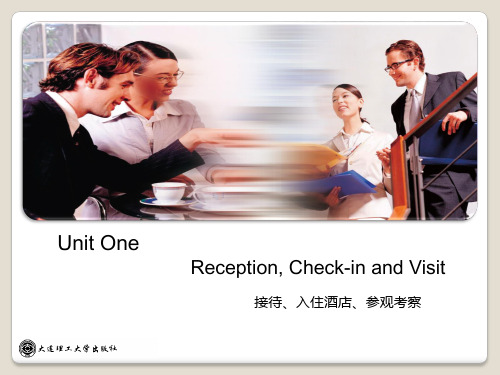
III. Dialogue Interpreting 对话口译
Mr. Zhang:
史密斯先生,您喝点什么?茶还是咖啡?
Mr. Smith:
I’d like a cup of tea. Actually I like Chinese tea very much.
Mr. Zhang:
很好。茶有提神的功效,而且对身体也很好。
Smith and Ms. Lora Brown from Port Klang Authority, Malaysia.)
Miss Liu:
Mr. Smith: Miss Liu:
Excuse me, you must be Mr. Smith from Port Klang Authority of Malaysia, aren’t you? Yes. I am John Smith from Port Klang Authority. How do you do, Mr. Smith? I’m Liu Lingling, an interpreter from Fangcheng Port (Group) Company.
Supplementary Reading 补充阅读
Directions: Work in groups of six. The first says three sentences about himself, the second one repeats these three sentences before saying his own, and then the third one repeats the six sentences before saying his own. Go on until each in the group takes his turn.
商务现场口译教案第一单元

Unit OneProtocol Routine and an Long-term PreparationTeaching PlanTeacher:Class Profile: 04BE 1Estimated time: 100 min. in 2 periodsI. Unit Objectives1.Ss understand what and how to prepare for the interpreting tasks in the long run.2.Ss find ways to improve your interpreting skills and performance.3.Ss master the basic words and expressions about protocol routine.4.Ss know some cultural background knowledge about protocol routine.II Materials and/or equipment1.Business Interpreting2.Other reference materials prepared by the teacher3.Overhead projectorputerIII Focus Points and Teaching ProceduresFirst period (50 minutes)Phase 1 Preparing 50 mI. An Overview of Interpreting 15 m●Definition and Types of Interpreting1). Consecutive Interpreting2). Simultaneous Interpreting●Past and Present of Interpreting1). Development of Modern Interpreting2). Professional Interpreting In China●Features and Process of interpreting1). Features of Interpreting1.Extemporaneousness(即席性);2.Stressfulness(紧张性);3.Independence(独立性);4.Comprehensiveness(综合性)5.Miscellaneousness(多面性)2). Process of Interpreting● Basic Requirements for Interpreters 1). A Strong Sense of Duty2). A High Level of Linguistic Proficiency 3). Wide Encyclopedic Knowledge4). A Good Mastery of Interpreting Skills ● Professional Codes of Conduct 1) confidentiality (保密), 2) impartiality (公正), 3) accuracy (准确), 4) objectiveness (客观) 5)competence (胜任).● “3P” Model for Interpreter TrainingI = P1 (S + K + V + C) + P2 (D + M + E + C) + P3 (A+ F + C). 1). Preparing P1 = S + K + V + C. 2). Performing P2 = D + M + E + C. 3). Packaging P3 = A+ F + C.II. Theory & Techniques: Long-term Preparation20 m● Warm-up activity● Presentation:1. Two Types of Pre-interpreting Preparation 1) Long-term Preparation2) Short-term Preparation2. What and How to Prepare in the Long Run1) What to Prepare? 2) How to Prepare?III. Phrase Interpreting5 m● Chinese- English● English-ChineseIV . Sentence Interpreting10 m● Chinese- English ● English-ChineseDecoding (听入解码) Memorizing(短期记忆)Encoding(编码输出)Preparing (译前准备) Performing (现场口译) Packaging (译后总结)Second period (50minutes)Phase 2 Performing 30 mI. Decoding--Notes Taking 5 mPlay the CD of text A, ask the students to catch the main ideas of the speech. Note down the key points while listening. Then tell the main ideas of the speech with the help of their notes.II. Memorizing--Story Retelling 5 mPlay the CD again, Ask some students to listen to the recordings of Text A again. Try to catch more details and improve their notes. Then retell the speech in their own words with the help of the notes.III. Encoding--Message Reconstructing 10 m●Play the CD again paragraph by paragraph, then ask the students to interpret the passageduring the pauses according to the notes they have taken. Choose some of the representatives to do it in class.●Show the reference note to the students, ask them to compare it with their own.●Then play the CD again which presenting the reference key. This time, the teacher will helpthem to check the interpretation.IV. Coordinating—Field Interpreting 10 m●Play the CD of text B. with a pause after each paragraph. Ask the students to take some noteswhile listening to the dialogue.●Ask two students to interpret what they have heard with the key points on their notes.●Choose some of the representatives to do it in class.●Then play the CD again which presenting the reference key. This time, the teacher will helpthem to check the interpretation.Phase 3 Packaging 20 mI. Interpreting and Assessment 15 m●Play the CD of text C with a pause after each paragraph. Ask the students to take some noteswhile listening to the speech..●Ask some students to interpret what they have heard with the key point on their notes.●Then ask two of them to do it again, one read the passage, the other tries to be the interpreter.Choose some of the representatives to do it in class.●Then play the CD again which presenting the reference key. This time, the teacher will helpthem to check the interpretation.●While the students are doing the interpretation of Text C, ask the other groups to makeassessment with their group members on the assessment form with the criterion given. In the end the teacher will ask the representatives to show the assessment form and then make some comment on the performance and assessment as well.Peer's Assessment FormII. Points to Remember 5 m● A well-prepared interpreter is usually confident and relaxed and an experiencedinterpreter never stops preparing for the interpreting tasks.●Interpreters must continually work to improve their mastery of basic linguistic andinterpreting skills; command of general and subject knowledge; and a strongcross-cultural awareness.●It is advisable for the trainees to keep on practicing interpreting, reading widely andlearning to collect and summarize what has been learned.After class activitiesI. Supplementary Exercises●Task I Simulation ExercisesDivide the students into several groups, ask them to role-play the following situations. They can make dialogues or speeches according to the words and expressions they have learned in the language bank acting as the Chinese speaker, English speaker and the interpreter respectively. One group will be invited to perform in class.●Task 2 Vocabulary DevelopmentAsk the students to read the following words and expressions about business travel. Try to keep them in mind so that they can put them to use in the simulation situations. Make some explanations where necessary. And ask them to find more to enrich the language bank.●Task 3Cultural SalonAsk the students to read the following presentation and try to get some cultural knowledge about travel arrangements. And make a group discussion about it. Make certain explanations where necessary.●Task 4 Interpreting PracticeAsk the students to work on the following sentences and text D. Interpret them into Chinese and English respectively. Then present the reference key to help them to check the answers.A. Sentence InterpretingB. Text Interpreting—Text DII. Self-assessment●After the students have completed all the tasks in this unit, ask them to finish the followingassessment form by themselves. This form contains some key points of interpretation skills,words and expressions, cultural background knowledge and the performance they have given.The teacher may give the reference answers to each element they have learned during this unit where necessary.Student Self-assessment Form1. Interpreting Skills—Long-term Preparation A B C D1.1 Importance of preparation in interpreting. □□□□1.2 Two types of preparation in interpreting □□□□1.3 What to prepare for interpreting tasks in the long run. □□□□1.4How to prepare for interpreting tasks in the long run □□□□2. Linguistic Notes about Protocol Routine2.1 Useful words and expressions □□□□2.2 Sample sentences □□□□3. Cultural Notes about Protocol Routine3.1 Ways to receive a foreign guest. □□□□3.2 Points to be remembered on a formal reception occasion □□□□3.3 Five elements to be considered when hosting a foreign delegation □□□□4. Phrase Interpreting about Protocol Routine4.1 Chinese-English □□□□4.2 English-Chinese□□□□5. Sentence Interpreting about Protocol Routine5.1 Chinese-English □□□□5.2 English-Chinese□□□□6. Text Interpreting about Protocol Routine6.1 Text A □□□□6.2 Text B □□□□6.3 Text C □□□□6.4 Text D □□□□7. Simulation Exercises about Protocol Routine7.1 Situation A □□□□7.2 Situation B □□□□III. Feedback and CommentsAfter they have finished the interpretation, ask the students to tell their classmates and teacher how they feel about the performance. Then you will make an overall comment on each of their performance and give your suggestion with the help of the following assessment form.。
商务英语口译Unit 1 Meeting at the airport
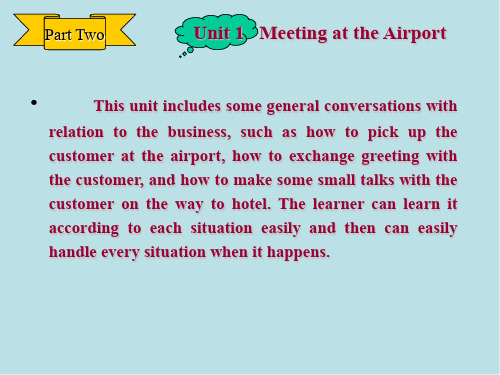
• Dialogue Three On the Way to Hotel (2)
• (It is still on the way to the hotel, and Li Hua and Mr. Wilson are talking about the scenery along the road.)
• ... ...
• W: How far is it to the hotel?
• L: About a Fifty-minute ride.
• W: In which hotel will we stay?
• L: We've reserved two suites for you at the Garden Hotel. It is one of the best hotels in Guangzhou. I hope you'll have a good stay there.
Part Two
Unit 1 Meeting at the Airport
• Dialogue One At the Airport
• (Li Hua, the sales manager of Guangzhou Textiles Corporation, is now at the airport to meet Mr. Wilson and his assistant, Mr. Parker. )
• P: How do you do , Mr. Li. Nice to meet you too.
Part Two
Unit 1 Meeting at the Airport
• L: (to Mr. Wilson and Mr. Parker) I came here to take you to your hotel.
- 1、下载文档前请自行甄别文档内容的完整性,平台不提供额外的编辑、内容补充、找答案等附加服务。
- 2、"仅部分预览"的文档,不可在线预览部分如存在完整性等问题,可反馈申请退款(可完整预览的文档不适用该条件!)。
- 3、如文档侵犯您的权益,请联系客服反馈,我们会尽快为您处理(人工客服工作时间:9:00-18:30)。
Performing --Coordinating (Field Interpreting)
1.
2.
3. 4.
5.
6. 7.
8.
9. 10.
销售代表 外贸部 取行李 停车场 直达航班 明天,会有时差反应 这样一来 倒一下时差 广东饮食 锦绣中华
1. 2.
3. 4.
5.
6.
7. 8. 9tive International Business Department claim luggage parking lot non-stop flight The jet lag will catch up with me tomorrow. in that case recover from jet lag the Cantonese gourmet Splendid China
Situation A You are the receptionist of A&R Company. A visitor, Mr. Carl Smith, has an appointment with the General Manager, John Lewis, but he is in a meeting at the moment. You receive the visitor and start a conversation with him. You speak Chinese while Carl is an English-speaker. Situation B You are Assistant Manager of Company Nike. Go to the airport to welcome Peter O’Donnell, a trainee manager in the head office in New York. Greet him, introduce yourself and make a small talk. On the way to the hotel, introduce the city and some places of interest. You speak Chinese while Peter is an English-speaker.
1.
2.
3. 4.
5.
Preparing --Sentences Interpreting
B. Chinese to English
1. Mr. Smith, I’m very happy to welcome you and all the other members of your delegation to our country. We hope you’ll have a pleasant visit here. 2. As a Chinese saying goes, “ Isn’t it a great pleasure to have friends coming from afar?” 3. Allow me to express our warm welcome and cordial greetings to our distinguished guests coming from afar. 4. I hope you will be frank with us and give whatever opinions and suggestions you may have in regard to the tentative schedule. We’ll see what we can do to meet your wishes. 5. You are welcome to visit us again any time. Our door is always open to friends.
Preparing --Skills Presentation
Two Types of Pre-interpreting Preparation Long-term Preparation Short-term Preparation
What and How to Prepare in the Long Run What to Prepare? How to Prepare?
Points to Remember
A well-prepared interpreter is usually confident and relaxed and an experienced interpreter never stops preparing for the interpreting tasks. Interpreters must continually work to improve their mastery of basic linguistic and interpreting skills; command of general and subject knowledge; and a strong cross-cultural awareness. It is advisable for the trainees to keep on practicing interpreting, reading widely and learning to collect and summarize what has been learned.
Preparing --Warm-up Exercises
How do you usually prepare for a reception task? Is preparation necessary in interpreting? Why/Why not? What and how shall an interpreter prepare for a reception-interpreting task? What kind of interpreting skills do you think an interpreter should master?
Packaging --Interpreting and Assessment
Packaging -- Feedback and Comments
Aims of this Unit Student’s Feedback Teacher’s Comments
The candidate has met the standard, knowledge and skill requirements. Candidates: ___________________ Assessor: ____________________ Date ___________________ Date ___________________
Preparing --Phrases Interpreting
A.
English to Chinese
1.
1. 2. 3. 4. 5. 6. 7.
8. 9. 10.
Recover from the jet lag Thoughtful Arrangement Hospitability Souvenir Accommodations Claim baggage Proceed through the customs Itinerary Farewell speech Adjust to the time difference
Performing --Encoding (Message Reconstructing)
尊敬的各位来宾,女士们,先生们: ……
作为一名在一家中美合资企业工作了两年的美国经理,我 以为中国人和美国人在经营管理中存在着差异。由于我 们之间有着不同的文化传统,所以我们比大部分中国同 行来得直率。我无法断言我们的经营方式一定在他们的 之上。毕竟各有各的优点和弊病。近年来,越来越多的 美国管理人员已认识到中国人那种更具人情味的管理方 式的长处。 ……
1.
2. 3.
4.
5.
6. 7. 8. 9.
10.
to hold a banquet in honor of…. to bid farewell to …. Come all the way to…. After you! I have long been looking forward to meeting you. a welcoming address to pay tribute to …. Looking back; Looking ahead Take care!
Performing --Decoding (Note-taking)
Performing --Memorizing (Story-retelling)
Listen to the recordings of Text A again. Try to catch more details and improve your notes. Then retell the speech in your own words with the help of your notes.
Packaging --Interpreting and Assessment
1.
1. 2.
3. 4.
5.
6.
远道来送行 你办了登机手续了 吗? 办理海关手续 我希望它能让你想 起我们的友谊 我们非常感谢你为 我们所做的一切。 “送君千里终有一 别”
2.
3. 4.
5.
6.
come all the way to see me off Have you checked in? go through customs I hope it will remind you of me and of our friendship. I appreciate very much everything you’ve done for me. “A thousand miles a person can see off a friend, but he has no choice but to say good-bye in the end.”
